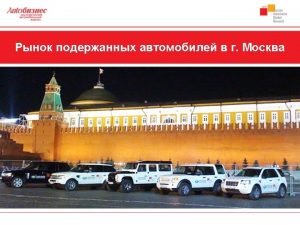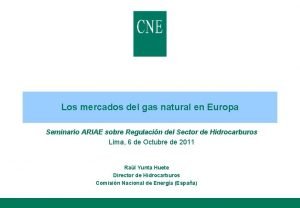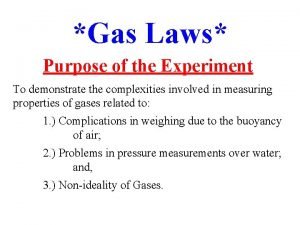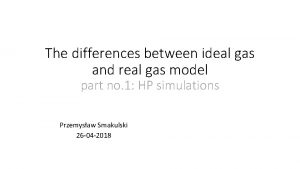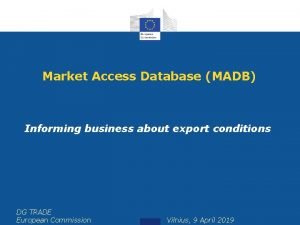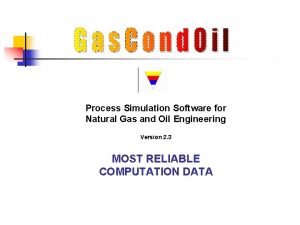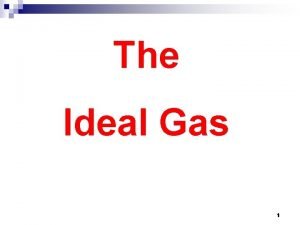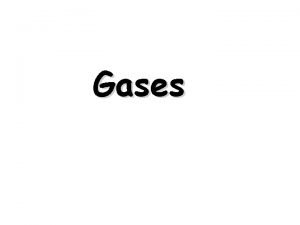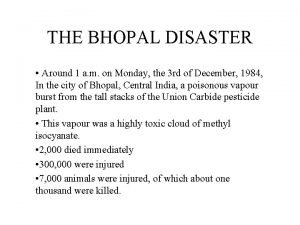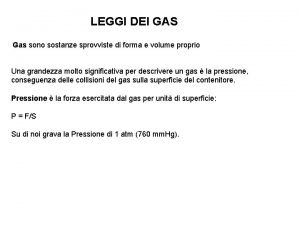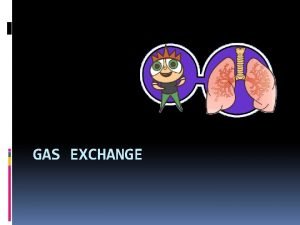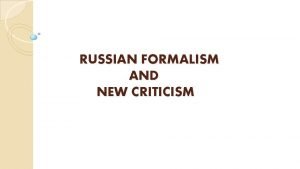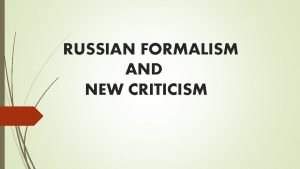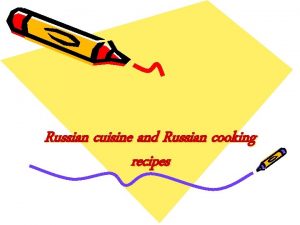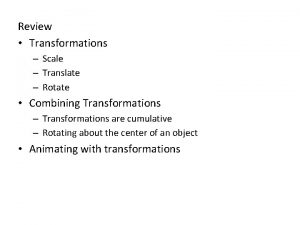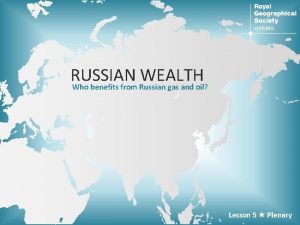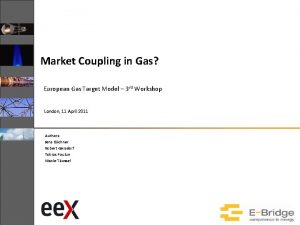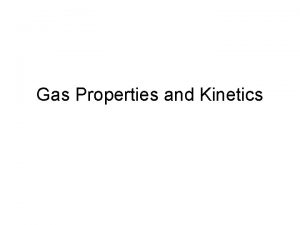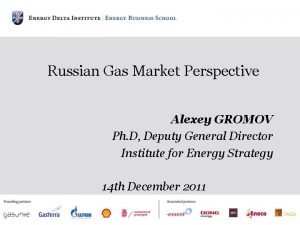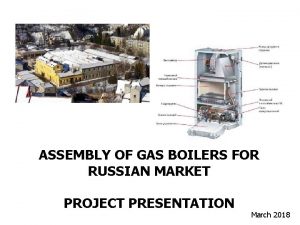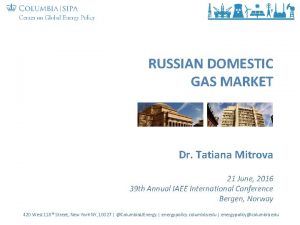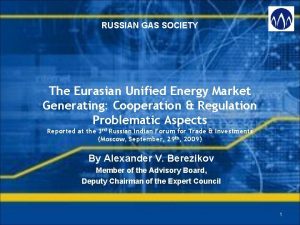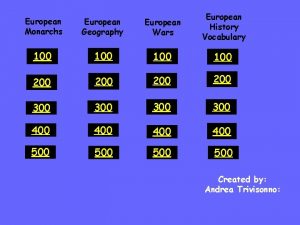Transformations of the European gas market and Russian





















- Slides: 21

Transformations of the European gas market and Russian gas export strategy Anna Galkina The Energy Research Institute of the Russian Academy of Sciences Moscow May 30, 2016

European gas market transformations 1

European gas balance: increasing import dependency, declining production and consumption European gas balance Notes: Turkey not included Source: IEA World energy balances 2015, IEA Natural gas information 2015 2

OECD Europe gas consumption has been flat for more than a decade Source: IEA Natural gas monthly 3

Gas in power sector: still not competitive Structure of used power generation capacities in Germany in June 2015 Source: ENTSO-E Structure of used power generation capacities in the UK in June 2015 Source: Gridwatch based on Balancing Mechanism Reporting System data Spark spreads for power generation from gas in most European countries has recently improved but still negative since 2012. Gas disappears from power generation balances of the European countries or becomes a back-up fuel. 4

LNG will claim more significant share of European gas demand as domestic production declines. Europe can import more LNG if it chooses, but it depends on the price it is willing to pay. Capacities of the European LNG terminals and LNG imports Source: IEA, Gas infrastructure Europe, Gas market of Europe: lost illusions, timid hopes, ERI RAS, HSE Energy Institute, September 2015 (in Russian) 5

Russian gas industry found itself in a completely new, quite unfavorable environment Domestic challenges: • Stagnation of the Russian economy slows down domestic gas demand. • The market is oversupplied and competition between Gazprom, Rosneft and Novatek is becoming really severe, increasing the pressure to liberalize the Russian domestic gas market and to remove Gazprom’s export monopoly for pipeline gas. • Lower investment availability and frozen domestic prices together with lower export prices cut Gazprom`s investment program. Global challenges: • Export revenues expectations are declining : q Stagnant gas demand, increasing tensions on the western markets for Gazprom, regulatory pressure. q Weak prospects in Asia, where Russian presence is very limited for the next 5 -7 years. q Increasing competition with the new gas suppliers (shale from the U. S. , Iran, Australia, East Africa, etc. ). q Low oil and gas prices until 2022 -2025. • Geopolitical threats: sanctions. 6

By 2025 in Europe 50% of the current contracts will expire. Russia has the largest contract portfolio, which guarantee it at least 120 bcma exports; everything on top of that will be spot-based Contracted gas supplies to Europe by major suppliers up to 2025 Source: Gas market of Europe: lost illusions, timid hopes, ERI RAS, HSE Energy Institute, September 2015 (in Russian) 7

European gas market is locked in the TOP contracts. In all realistic scenarios Russia remains key supplier to the European market. However the perspectives of Russian exports growth to Europe are very limited European* gas balance bcm 700 Indigenous production 600 MCQ LNG 500 MCQ pipeline gas 400 ACQ LNG 300 ACQ pipeline gas 200 Demand range 100 Demand 07 20 08 20 09 20 10 20 11 20 12 20 13 20 14 20 15 20 16 20 17 20 18 20 19 20 20 20 21 20 22 20 23 20 24 20 25 06 20 20 20 05 0 * Europe-41 without Turkey Source: ERI RAS 8

Existing long-term contracts to Europe leave little room for additional gas supplies up to 2020 -2025 Gas supply contracts and net imports to North West Europe, bcm Gas supply contracts and net imports to Central Europe, bcm Gas supply contracts and net imports to Mediterranean Europe, bcm Gas supply contracts and net imports to South East Europe, bcm Source: Nexant, IEA database 9

Russian price strategy in Europe is in fact more flexible than declared q Russia’s policy with regard to contract review has been based on the principal of delaying for as long as possible before providing the minimum discount acceptable to each buyer. q In 2013 Gazprom started to implement a new price discount model with so-called retroactive payments. q Despite Gazprom`s strident rhetoric in favor of traditional oil indexation, in actual fact numerous adjustments and contract reviews have already been made in the course of the last 6 years. q Analysis of Gazprom`s official reports demonstrates a much more flexible negotiating position than has commonly been thought to be the case. During the period 2009 – mid-2015 as many as 65 times gas supply contracts were reviewed with 30 clients, providing price discounts, easing of take -or-pay obligations and a certain introduction of a spot component. q Calculations using Russian Customs Service statistics, Gazprom reports and the Nexant World Gas Model (which allows the assessment of contractual prices based on the prices of oil products), clearly show the increasing differential between actual sales prices and prices, calculated based on pre-crisis traditional oil-linked price formula. In fact, by 2014 Gazprom had already provided nearly on average 25% discount (or 90$/mcm) to its European customers compared to its pre-crisis traditional oil-linked price formulas. 10

European buyers has been turning to Gazprom requesting to review long-term contracts since 2009 Source: Gas market of Europe: lost illusions, timid hopes, ERI RAS, HSE Energy Institute, September 2015 (in Russian) 11

The gap between oil-indexed and spot prices is narrowing, pressure from the consumer side is decreasing Sources: NCG, IMF. Oil indexed natural gas prices in Europe are declining followed by oil price while becoming quite attractive compared to the levels of spot gas prices. The traditional Russian gas export strategy is being adapted to the new market conjuncture and regulatory framework 12

With the lower oil prices Russia’s export volumes and market niche in Europe have almost recovered Sources: Federal Customs Service, Russian Central Bank 13

Russia would try to protect, modernize and prolong existing LTCs, as complete switching to spot sales is leading to significant loss in revenues, as well as protection of oil indexation Russian gas export revenues under different scenarios Bln. $ Cancellation of the LTCs, gas sales on spot Oil indexation 100% spot indexation in LTCs 50% spot indexation in LTCs Baseline scenario Source: Gas market of Europe: lost illusions, timid hopes, ERI RAS, HSE Energy Institute, September 2015 (in Russian) 4

Russia is well placed to defend its market share on European gas markets if needed q The EU wants to diversify away from Russia, but there are few alternatives and the EU knows it. Little gas available through the Southern Corridor, limited capability by Norway to increase production, declining production in North Africa due to political unrest and mismanagement. q The next fight for EU gas market share will therefore be a fight between Russian gas and LNG (first of all US LNG). If Russian gas will be threatened, Russia will no longer fight for high gas prices (as in 2009), but for market share, even if this means low prices. q Compared to most of its new competitors, Russia has a lower cost gas supply base and can thus engage on a price war if needed. Source: Author q Nevertheless Russia would prefer to avoid price war with the US and Qatar LNG in order to maintain export revenues. 15

Russia started its historical gas shift Eastwards q Now there is clear urgent need for Russia to diversify its energy export markets: § There is no room for increase of Russian exports to Europe § Increasing competition (North American shale gas and oil, potential Iran, Iraq, Australia, Brazil entrance to the global markets) § For geopolitical reasons Europe is targeting to decrease dependence on Russian energy supplies § The sanctions target the finance and energy sectors, restricting some state firms' and banks' ability to raise financing q North-East Asia seems to be the most attractive new energy market § Asian markets are demonstrating the highest growth rates even during the crises, and according to all projections, they will drive future global hydrocarbon demand growth § Lack of own energy resources (and problems with nuclear in Japan) make North-East Asian countries ideal, complimentary partners for Russia in the energy trade. q Asian partners are regarded by Russia not only as a market, but also as a source of financing, technologies, equipment and even labor force. q Creation of the new energy infrastructure in the Russian Eastern Siberia and the Far East is regarded as a tool to accelerate country`s economic growth, helping to form new industrial clusters based on the development of energy resource production and processing. 16

Russia is hardly able to provide for any visible increase of Asiaoriented gas export in 5 -7 years, LNG exports are limited by the sanctions § Power of Siberia construction has not really started, delays are already announced (May 2019 at earliest, May 2021 – the latest). § § § The project was hardly breaking even at 100 $/bbl, but under the current prices it is completely unattractive for Gazprom Chayanda gas field development (feed gas for the project) turned out to be much more challenging technologically China did not provide the promised down payment § Altai pipeline negotiations seem to be very complicated. § § § Chinese gas demand slows down considerably, the market is overcontracted until 2025 No need for gas in NW part of the country, where Altai would land Difficult price negotiations § Russian LNG projects, targeting Asia, are in limbo – no supply growth is expected before 2020. § § Sachalin-2 expansion with Shell has recently got under direct US sanctions Sakhalin-1 LNG faces tremendous difficulties because of the sanctions against Rosneft Vladivostok LNG officially “postponed for an undefined period of time” Yamal LNG struggling to attract financing § Sakhalin-China gas pipeline, announced recently, does not have any feasibility study and might make China a monopsonic buyer of the Russian gas § 7 Russian LNG projects are currently under consideration, all of them face commercial, technical or regulatory challenges, especially under the sanctions; only Yamal LNG looks realistic before 2025 17

During the next decade Europe will remain the main market for the Russian gas exports, while in Asia Russian (and Central Asian) pipeline gas could set a floor price for LNG supplies bcm Russian gas export dynamics forecast up to 2030 The main increase in Russian gas exports (if LNG is allowed) will be to Asia, LNG export volumes are most uncertain. Russian gas export volume estimations are reviewed significantly downward (from 400 bcm to 250 bcm in the longer-term), but still remain the highest in the world. 2

Сonclusions § More competitive external environment and domestic challenges are creating less favorable conditions for the Russian energy sector. § We do not foresee a radical shift away from dependency on Russian natural gas supplies to Europe. Most alternative supplies are only second best options and a substantial amount of natural gas supplies is tied up in long-term contracts. § The perspectives of Russian exports growth to Europe are very limited due to overcontraction and low demand growth, however Russian gas industry still has a huge potential for production and export growth. § Cooperation between Russia and Europe in the gas sector have moved from strategic partnership to a normal commercial interaction, burdened by political disputes. § Asian and domestic markets are becoming more attractive than European market with weak demand stronger competition 19

Contacts The Energy Research Institute of the Russian Academy of Sciences 31/2 Nagornaya str, 117186, Moscow, Russian Federation phone: +7 926 612 87 69 fax: +7 499 135 88 70 web: www. eriras. ru e-mail: galkina@outlook. com 20
 Requirements for effective segmentation
Requirements for effective segmentation Leader challenger follower nicher
Leader challenger follower nicher Abiz
Abiz Icis heren european spot gas markets
Icis heren european spot gas markets Differences between ideal gas and real gas
Differences between ideal gas and real gas Difference between ideal gas and real gas
Difference between ideal gas and real gas European leasing market
European leasing market European market basket
European market basket Market access database export
Market access database export Process simulation software in oil and gas market
Process simulation software in oil and gas market Derive ideal gas equation
Derive ideal gas equation Imaginary gas
Imaginary gas Ideal gas vs perfect gas
Ideal gas vs perfect gas Conclusion for bhopal gas tragedy
Conclusion for bhopal gas tragedy Gas leaked in bhopal gas tragedy
Gas leaked in bhopal gas tragedy Gas reale e gas ideale
Gas reale e gas ideale Flue gas desulfurisation gas filter
Flue gas desulfurisation gas filter Poisonous gas leaked in bhopal gas tragedy
Poisonous gas leaked in bhopal gas tragedy Kinetika kimia
Kinetika kimia Gas exchange key events in gas exchange
Gas exchange key events in gas exchange Primary target market and secondary target market
Primary target market and secondary target market Decision making units
Decision making units


